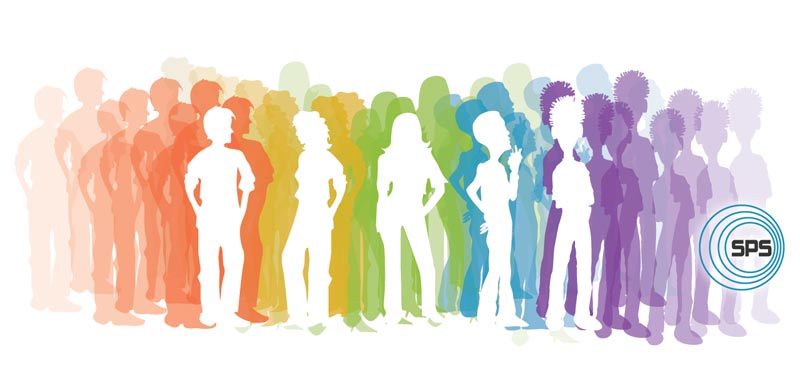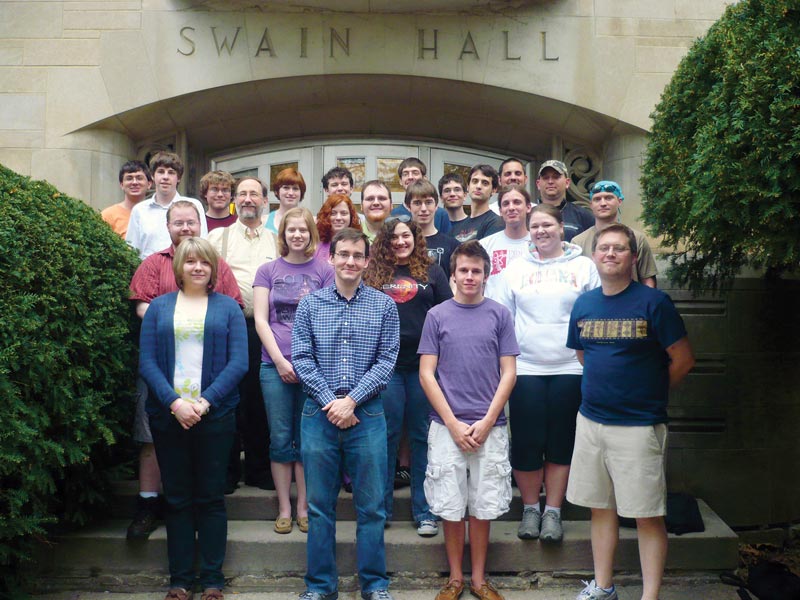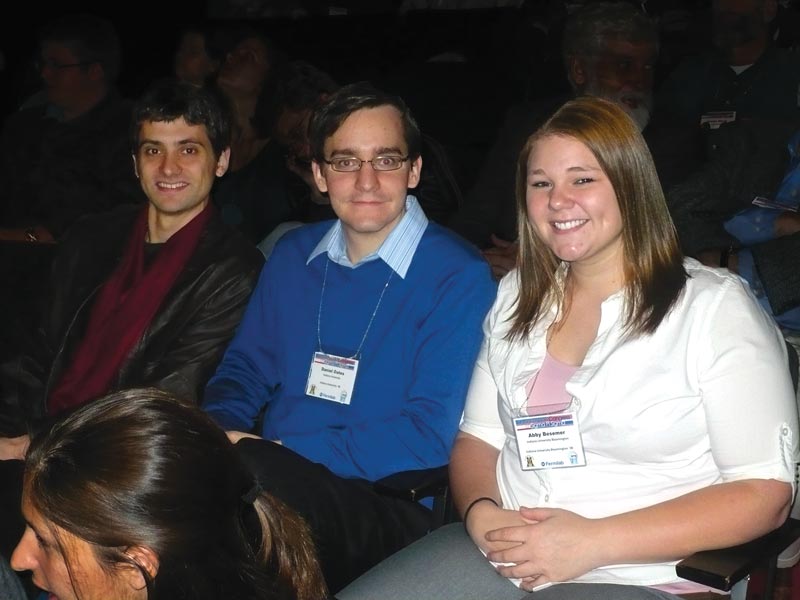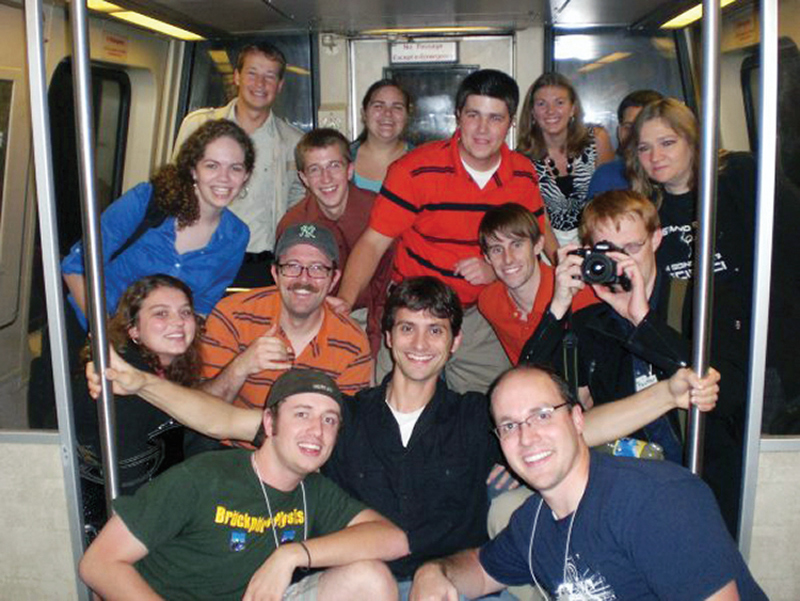Living the SPS Life
Spring
2013
Special Feature
Living the SPS Life
SPS Leader Found Free Pizza, and More
By:Chris Faesi at Harvard University

In my first week as a first-year physics student at Indiana University (IU), I noticed fliers posted around campus advertising something called “Physics Club.” The fliers also mentioned free pizza. I didn’t know what the club was all about, but I knew I liked physics, and I knew I liked pizza (especially free pizza).

That was enough to get me in the door. What kept me coming back every week after that, and what made me get more and more involved in what I later learned was the Society of Physics Students (SPS), was the remarkable camaraderie. The support of my fellow students helped me get through difficult classes, and the fun we had together made me remember not to take life too seriously. Interacting with faculty gave us a safe introduction to the professional world of physics. The outreach we conducted taught us that science is for everyone and not just for scientists. Without SPS, I don’t know if I would have continued on to pursue a PhD program in astrophysics.
In November of 2008, our chapter president asked if anyone was interested in going to a “Sigma Pi Sigma Congress” in Chicago. I didn’t know what that meant, aside from a road trip and a chance to meet other people who liked physics. But like walking into that first club meeting, I decided to give it a chance.
If joining the IU Physics Club opened the door to the world of physics beyond the classroom for me, Congress 2008 knocked the entire wall down. I was not prepared for the flood of energy and excitement that accompanied what amounted to a three-day takeover of FermiLab by 600 excited physics students from across the country. Between the thought-provoking lectures, the organized discussion sessions, tours of the lab, and the late nights talking with new friends, I think I totaled only 4 hours of sleep the entire weekend!
At Congress 2008 I learned that IU’s physics club did not exist in a vacuum. We are just one of hundreds of chapters across the country, all part of a national organization called the Society of Physics Students. Discovering that network was like suddenly realizing that not only is our solar system just one of many in the galaxy, but that the galaxy possesses ordered motion and organized structure that promotes the formation and evolution of those solar systems.
The theme of that congress was “Scientific Citizenship.” Though I’ve always felt that everyone has a responsibility to bring their professional expertise to bear on global issues, I had no idea what scientific citizenship really was. It turned out that I was in good company, as the goal of the congress was to help define what it meant and explore how we as physics students could participate as good scientific citizens and spread what we had learned to the wider world.

Many ideas came out of the discussions. Central to all of them was the idea that scientists have not just the ability, but also the responsibility to engage with the public. This responsibility includes explaining our science in comprehensible terms, as well as utilizing our analytical skills to contribute to debates on nonscience issues. I never would have guessed when I enrolled at IU as a physics major that I would soon be sitting at one of 50 or so tables full of physics students discussing not quantum mechanics or thermodynamics, but broadly relevant and critical issues such as the energy crisis, diversity, and science policy.
After coming back from FermiLab, I wanted to revitalize IU’s chapter and took on the role of chapter president with reckless abandon. By the following semester, we had tripled meeting attendance and increased the number of national SPS members by a factor of two. Our newly invigorated chapter built demonstrations, went to elementary school science fairs, posted videos on YouTube, and hosted lectures on science and career issues (such as what to do with a physics degree after graduating). With departmental support, we even upgraded to gourmet pizza.
Motivated by our success, I wanted to spread this momentum to other chapters. I learned at Congress 2008 that the SPS National Council, the governing body of SPS, is composed of 18 faculty advisors (“zone councilors”) and 18 student representatives (“associate zone councilors,” or “AZCs”), each from a different geographic region, or “zone.” Joining the National Council seemed like the perfect way to become more involved, so I put my name on the ballot for AZC in zone 8, the zone that includes IU.
I honestly didn’t expect to be elected. I knew no one outside my chapter, but my candidate statement must have conveyed my enthusiasm effectively; the chapters of zone 8 voted me into office. Working at the national level allowed me to connect with students across the country and shape the global direction of the society through council actions. For example, we drafted and approved key statements on undergraduate research and diversity, which were then promoted nationally both within and outside the organization. Statements like these, developed by the SPS National Council, serve to drive programs and initiatives for the society. In my fellow councilors, I found a new level of camaraderie: the other AZCs were among the most motivated, thoughtful, and well-rounded individuals I’ve ever had the pleasure of interacting with. And I’ve never seen a group of faculty care more about students than the professors who served on the council. During my second term, my fellow AZCs elected me to be the student representative to the Executive Committee, the highest position of student leadership in the SPS organization.

At every step, I was motivated to keep seeking leadership roles. For the first time in my life, I truly believed in the mission of an organization. SPS helped me realize that in science and in life, it’s okay sometimes to not have all the answers. Issues such as scientific citizenship are tough, and the solutions aren’t trivial—just like in nonlinear magnetohydrodynamics—and in both cases, pursuing the question is more important than solving the problem.
SPS has also taught me the importance of mentorship. I’ve been lucky to have some great mentors, such as former SPS Director Gary White. Among many things, White demonstrated to me that leadership is not about telling people what to do, but about sharing your enthusiasm and enabling others to pursue their interests and develop their talents. I now hope to mentor the next generation of undergraduates, passing on what I have learned.
SPS has also taught me that in science, communication is central. If you can’t explain your scientific breakthrough clearly, no one will understand its importance.
Communication has become a central part of my graduate school career. I visit SPS chapters and give talks about astronomy and science communication. I am an author for Astrobites, a popular astronomy research blog for undergraduates. I’m helping to organize a workshop for graduate students this summer specifically focused on communicating science. And because of my own experience at Congress 2008, I leapt at the chance to help organize Congress 2012 (a.k.a. PhysCon) this past fall and maybe inspire another first-year student or two to get involved in physics beyond the classroom.
Perhaps someday I’ll be a chapter advisor myself, pushing my students to apply for leadership positions and continuing the cycle into the future. SPS represents the physics world as it can and should be: open, collegial, energetic, and optimistic.
My involvement with SPS has changed my life. But some things haven’t changed since my first semester as an undergraduate. I still never turn down an opportunity for free food. //
